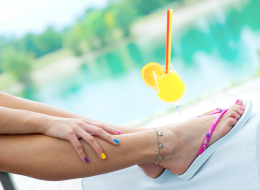Walk On The Wild Side What Your Walking Style Reveals About Your Sex Life... And More
The way you walk says a lot about your sexual satisfaction, your handbag size and even how long you’ll live.
You could walk a mile in a woman’s shoes to get a peek into her life. Or you could simplify things a whole lot and just watch her walk. How's that, you might ask? According to scientists, a woman’s stride says a lot about her, including how many vaginal orgasms she’s had, whether she’s destined to live a long life and what kind of issues (bunions, diabetes, etc.) may be plaguing her.
A Fluid and Confident Stride Signifies An Awesome Sex Life
When it comes to mattress mambos, a lady never tells — at least with her lips. But her gait definitely says a lot about her sexual history. A Belgium study published in the Journal of Sexual Medicine found that women who have fluid, free and energetic walks (free of “flaccid and locked” muscles) have had many vaginal orgasms. Crazy climax numbers, so they say, loosen pelvic muslces. Meanwhile, women who have a stiff or short stride are more likely to exhibit sexual restraint. The so-called “blocked” pelvic muscles were found to be associated with psychosexual impairments, which limits a woman’s ability to achieve vaginal orgasms.
Those Destined To Live Long Have Speedy Strides
If your tootsies usually jet you places in a New York minute, you’re most likely a healthy, active person destined to live a very long life, so say researchers at the University of Pittsburgh. Their study of 34,000 people over the age of 65 (both male and female) found that participants who walked slower than 2 feet per second had an increased risk of dying, while those who walked faster than 3.3 feet per second survived much longer than expected based on gender and age.
Slow Strides Can Signify Slow Minds, As Well
People who walk at a turtle pace might want to be prepared for more than just the possibility of smelling the roses. Researchers from Boston Medical Center have determined that adults who walk slowly are one and a half times more likely to develop dementia. Furthermore, slower walking speeds have been associated with low levels of neurons that carry out brain processing, as well as decreased performance on language, memory and decision-making tests.
Signs You’re Developing Bunions Or Your Handbag Is Too Heavy
Find yourself avoiding stairs? That’s a classic symptom of developing bunions. The big toe must bend, which can create excruciating pain. Find yourself stomping a lot? That’s a possible sign of diabetes or a vitamin B12 deficiency. Both can cause a lack of sensation in the feet, leading a person to unintentionally stomp in order to feel their feet touch the ground.
Meanwhile, carrying a heavy purse gives you more than just back problems. According to Dr. Richard Jones, a senior lecturer in clinical biomechanics at the University of Salford, “a heavy bag on the right shoulder will compress that side of the body and over time cause the left leg to be a little longer (as the other leg is compressed),” which he says leads to limping. And that, dear readers, is the defintion of a literal drag.
Notice concerning medical entries:
Articles having medical content shall serve exclusively for the purpose of general information. Such articles are not suitable for any (self-) diagnosis and treatment of individual illnesses and medical indications. In particular, they cannot substitute for the examination, advice, or treatment by a licensed physician or pharmacist. No replies to any individual questions shall be effected through the articles.





